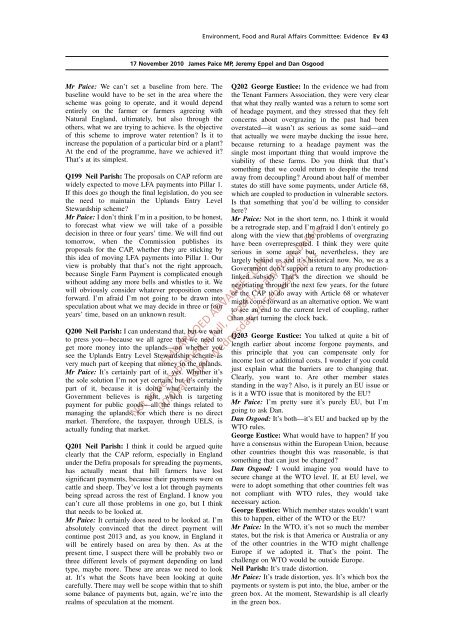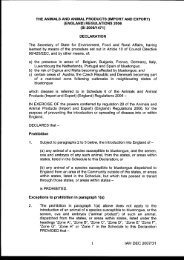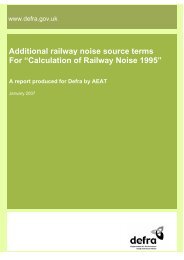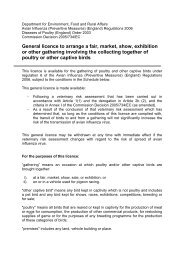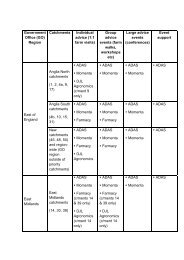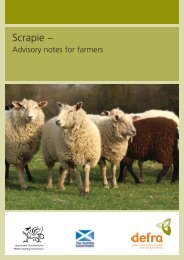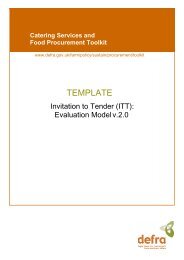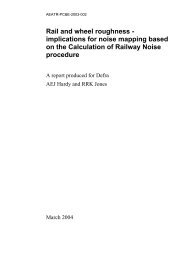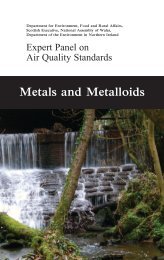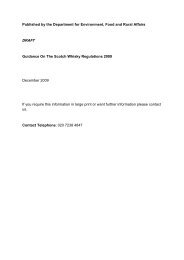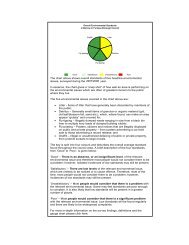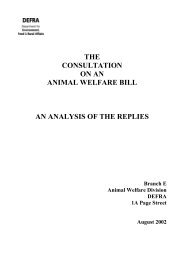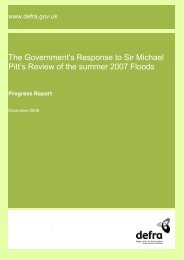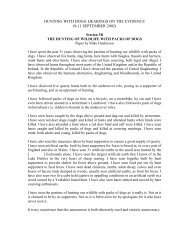Farming in the Uplands - ARCHIVE: Defra
Farming in the Uplands - ARCHIVE: Defra
Farming in the Uplands - ARCHIVE: Defra
You also want an ePaper? Increase the reach of your titles
YUMPU automatically turns print PDFs into web optimized ePapers that Google loves.
Environment, Food and Rural Affairs Committee: Evidence Ev 43<br />
17 November 2010 James Paice MP, Jeremy Eppel and Dan Osgood<br />
Mr Paice: We can’t set a basel<strong>in</strong>e from here. The<br />
basel<strong>in</strong>e would have to be set <strong>in</strong> <strong>the</strong> area where <strong>the</strong><br />
scheme was go<strong>in</strong>g to operate, and it would depend<br />
entirely on <strong>the</strong> farmer or farmers agree<strong>in</strong>g with<br />
Natural England, ultimately, but also through <strong>the</strong><br />
o<strong>the</strong>rs, what we are try<strong>in</strong>g to achieve. Is <strong>the</strong> objective<br />
of this scheme to improve water retention? Is it to<br />
<strong>in</strong>crease <strong>the</strong> population of a particular bird or a plant?<br />
At <strong>the</strong> end of <strong>the</strong> programme, have we achieved it?<br />
That’s at its simplest.<br />
Q199 Neil Parish: The proposals on CAP reform are<br />
widely expected to move LFA payments <strong>in</strong>to Pillar 1.<br />
If this does go though <strong>the</strong> f<strong>in</strong>al legislation, do you see<br />
<strong>the</strong> need to ma<strong>in</strong>ta<strong>in</strong> <strong>the</strong> <strong>Uplands</strong> Entry Level<br />
Stewardship scheme?<br />
Mr Paice: I don’t th<strong>in</strong>k I’m <strong>in</strong> a position, to be honest,<br />
to forecast what view we will take of a possible<br />
decision <strong>in</strong> three or four years’ time. We will f<strong>in</strong>d out<br />
tomorrow, when <strong>the</strong> Commission publishes its<br />
proposals for <strong>the</strong> CAP, whe<strong>the</strong>r <strong>the</strong>y are stick<strong>in</strong>g by<br />
this idea of mov<strong>in</strong>g LFA payments <strong>in</strong>to Pillar 1. Our<br />
view is probably that that’s not <strong>the</strong> right approach,<br />
because S<strong>in</strong>gle Farm Payment is complicated enough<br />
without add<strong>in</strong>g any more bells and whistles to it. We<br />
will obviously consider whatever proposition comes<br />
forward. I’m afraid I’m not go<strong>in</strong>g to be drawn <strong>in</strong>to<br />
speculation about what we may decide <strong>in</strong> three or four<br />
years’ time, based on an unknown result.<br />
Q200 Neil Parish: I can understand that, but we want<br />
to press you—because we all agree that we need to<br />
get more money <strong>in</strong>to <strong>the</strong> uplands—on whe<strong>the</strong>r you<br />
see <strong>the</strong> <strong>Uplands</strong> Entry Level Stewardship scheme as<br />
very much part of keep<strong>in</strong>g that money <strong>in</strong> <strong>the</strong> uplands.<br />
Mr Paice: It’s certa<strong>in</strong>ly part of it, yes. Whe<strong>the</strong>r it’s<br />
<strong>the</strong> sole solution I’m not yet certa<strong>in</strong>, but it’s certa<strong>in</strong>ly<br />
part of it, because it is do<strong>in</strong>g what certa<strong>in</strong>ly <strong>the</strong><br />
Government believes is right, which is target<strong>in</strong>g<br />
payment for public goods—all <strong>the</strong> th<strong>in</strong>gs related to<br />
manag<strong>in</strong>g <strong>the</strong> uplands, for which <strong>the</strong>re is no direct<br />
market. Therefore, <strong>the</strong> taxpayer, through UELS, is<br />
actually fund<strong>in</strong>g that market.<br />
Q201 Neil Parish: I th<strong>in</strong>k it could be argued quite<br />
clearly that <strong>the</strong> CAP reform, especially <strong>in</strong> England<br />
under <strong>the</strong> <strong>Defra</strong> proposals for spread<strong>in</strong>g <strong>the</strong> payments,<br />
has actually meant that hill farmers have lost<br />
significant payments, because <strong>the</strong>ir payments were on<br />
cattle and sheep. They’ve lost a lot through payments<br />
be<strong>in</strong>g spread across <strong>the</strong> rest of England. I know you<br />
can’t cure all those problems <strong>in</strong> one go, but I th<strong>in</strong>k<br />
that needs to be looked at.<br />
Mr Paice: It certa<strong>in</strong>ly does need to be looked at. I’m<br />
absolutely conv<strong>in</strong>ced that <strong>the</strong> direct payment will<br />
cont<strong>in</strong>ue post 2013 and, as you know, <strong>in</strong> England it<br />
will be entirely based on area by <strong>the</strong>n. As at <strong>the</strong><br />
present time, I suspect <strong>the</strong>re will be probably two or<br />
three different levels of payment depend<strong>in</strong>g on land<br />
type, maybe more. These are areas we need to look<br />
at. It’s what <strong>the</strong> Scots have been look<strong>in</strong>g at quite<br />
carefully. There may well be scope with<strong>in</strong> that to shift<br />
some balance of payments but, aga<strong>in</strong>, we’re <strong>in</strong>to <strong>the</strong><br />
realms of speculation at <strong>the</strong> moment.<br />
Q202 George Eustice: In <strong>the</strong> evidence we had from<br />
<strong>the</strong> Tenant Farmers Association, <strong>the</strong>y were very clear<br />
that what <strong>the</strong>y really wanted was a return to some sort<br />
of headage payment, and <strong>the</strong>y stressed that <strong>the</strong>y felt<br />
concerns about overgraz<strong>in</strong>g <strong>in</strong> <strong>the</strong> past had been<br />
overstated—it wasn’t as serious as some said—and<br />
that actually we were maybe duck<strong>in</strong>g <strong>the</strong> issue here,<br />
because return<strong>in</strong>g to a headage payment was <strong>the</strong><br />
s<strong>in</strong>gle most important th<strong>in</strong>g that would improve <strong>the</strong><br />
viability of <strong>the</strong>se farms. Do you th<strong>in</strong>k that that’s<br />
someth<strong>in</strong>g that we could return to despite <strong>the</strong> trend<br />
away from decoupl<strong>in</strong>g? Around about half of member<br />
states do still have some payments, under Article 68,<br />
which are coupled to production <strong>in</strong> vulnerable sectors.<br />
Is that someth<strong>in</strong>g that you’d be will<strong>in</strong>g to consider<br />
here?<br />
Mr Paice: Not <strong>in</strong> <strong>the</strong> short term, no. I th<strong>in</strong>k it would<br />
be a retrograde step, and I’m afraid I don’t entirely go<br />
along with <strong>the</strong> view that <strong>the</strong> problems of overgraz<strong>in</strong>g<br />
have been overrepresented. I th<strong>in</strong>k <strong>the</strong>y were quite<br />
serious <strong>in</strong> some areas but, never<strong>the</strong>less, <strong>the</strong>y are<br />
largely beh<strong>in</strong>d us and it’s historical now. No, we as a<br />
Government don’t support a return to any productionl<strong>in</strong>ked<br />
subsidy. That’s <strong>the</strong> direction we should be<br />
negotiat<strong>in</strong>g through <strong>the</strong> next few years, for <strong>the</strong> future<br />
of <strong>the</strong> CAP to do away with Article 68 or whatever<br />
might come forward as an alternative option. We want<br />
to see an end to <strong>the</strong> current level of coupl<strong>in</strong>g, ra<strong>the</strong>r<br />
than start turn<strong>in</strong>g <strong>the</strong> clock back.<br />
Q203 George Eustice: You talked at quite a bit of<br />
length earlier about <strong>in</strong>come forgone payments, and<br />
this pr<strong>in</strong>ciple that you can compensate only for<br />
<strong>in</strong>come lost or additional costs. I wonder if you could<br />
just expla<strong>in</strong> what <strong>the</strong> barriers are to chang<strong>in</strong>g that.<br />
Clearly, you want to. Are o<strong>the</strong>r member states<br />
stand<strong>in</strong>g <strong>in</strong> <strong>the</strong> way? Also, is it purely an EU issue or<br />
is it a WTO issue that is monitored by <strong>the</strong> EU?<br />
Mr Paice: I’m pretty sure it’s purely EU, but I’m<br />
go<strong>in</strong>g to ask Dan.<br />
Dan Osgood: It’s both—it’s EU and backed up by <strong>the</strong><br />
WTO rules.<br />
George Eustice: What would have to happen? If you<br />
have a consensus with<strong>in</strong> <strong>the</strong> European Union, because<br />
o<strong>the</strong>r countries thought this was reasonable, is that<br />
someth<strong>in</strong>g that can just be changed?<br />
Dan Osgood: I would imag<strong>in</strong>e you would have to<br />
secure change at <strong>the</strong> WTO level. If, at EU level, we<br />
were to adopt someth<strong>in</strong>g that o<strong>the</strong>r countries felt was<br />
not compliant with WTO rules, <strong>the</strong>y would take<br />
necessary action.<br />
George Eustice: Which member states wouldn’t want<br />
this to happen, ei<strong>the</strong>r of <strong>the</strong> WTO or <strong>the</strong> EU?<br />
Mr Paice: In <strong>the</strong> WTO, it’s not so much <strong>the</strong> member<br />
states, but <strong>the</strong> risk is that America or Australia or any<br />
of <strong>the</strong> o<strong>the</strong>r countries <strong>in</strong> <strong>the</strong> WTO might challenge<br />
Europe if we adopted it. That’s <strong>the</strong> po<strong>in</strong>t. The<br />
challenge on WTO would be outside Europe.<br />
Neil Parish: It’s trade distortion.<br />
Mr Paice: It’s trade distortion, yes. It’s which box <strong>the</strong><br />
payments or system is put <strong>in</strong>to, <strong>the</strong> blue, amber or <strong>the</strong><br />
green box. At <strong>the</strong> moment, Stewardship is all clearly<br />
<strong>in</strong> <strong>the</strong> green box.<br />
EMBARGOED ADVANCE COPY:<br />
Not to be published <strong>in</strong> full, or part, <strong>in</strong> any form before<br />
00.01am GMT Wednesday 16 February 2011


